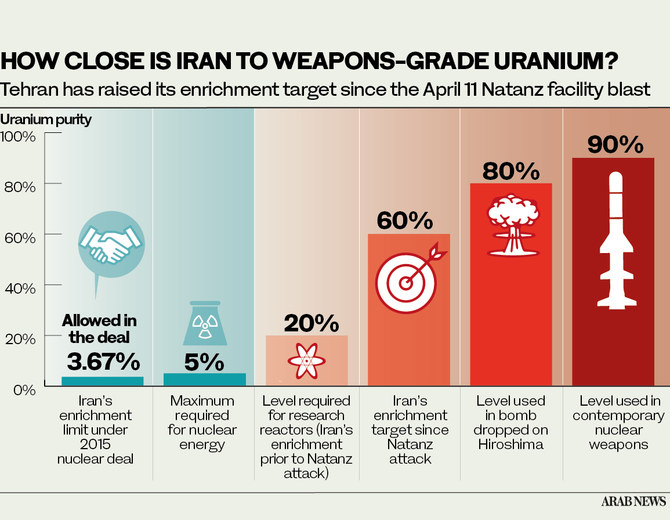WASHINGTON, DC: The ongoing parley in Vienna between Iran and five signatories of the 2015 nuclear accord has begun to look like the proverbial game of chicken. The hawk — Tehran — has no pressing reason to yield to the dove’s demand that it abide by the limits set by the deal, also known as the Joint Comprehensive Plan of Action (JCPOA).
Being in the role of the hawk, however, does have a downside for Iran: It runs the risk of overplaying its hand and ending up with nothing to show for its single-minded pursuit of getting the sanctions imposed by the Trump administration removed, analysts say.
Likewise, it may make sense for Parliament Speaker Mohammad Bagher Ghalibaf to voice his opposition to further renewal of the deal allowing inspection of Iran’s nuclear sites, but there is no proof so far that such bargaining tactics are working.
That said, Tehran must be pleased to hear the warning just sounded by Rafael Grossi, director general of the International Atomic Energy Agency (IAEA), that Iran’s uranium enrichment program is “very concerning” as the radioactive metal used to power nuclear reactors is being processed to purity levels that “only countries making bombs are reaching.”
“Iran often plays hardball in negotiations, and I suspect that it’s testing the limits to see what it can get away with,” Matt Kroenig, a professor in the Department of Government and the Edmund A. Walsh School of Foreign Service at Georgetown University, told Arab News.
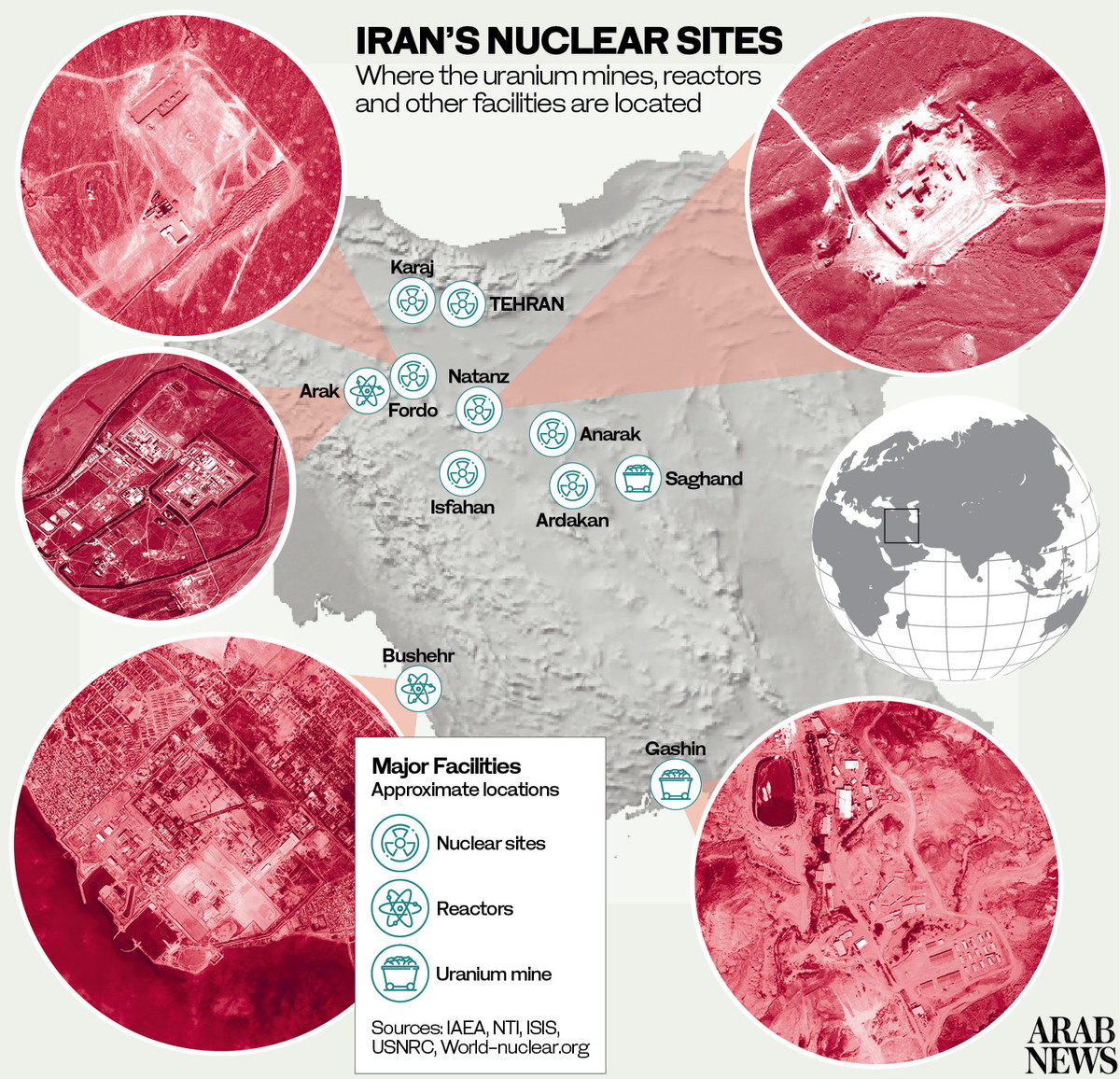 “In the end, however, I suspect we’ll see a return to the nuclear deal with the terms as formulated in 2015. Iran needs the sanctions relief, and the Biden administration wants (what it will portray back home as) an early diplomatic victory.”
“In the end, however, I suspect we’ll see a return to the nuclear deal with the terms as formulated in 2015. Iran needs the sanctions relief, and the Biden administration wants (what it will portray back home as) an early diplomatic victory.”
But some experts fear that a return to the JCPOA — from which the US unilaterally pulled out in May 2019 — could end up offering Iran an eventual pathway toward developing nuclear weapons. Additionally, they say, if Iran is allowed to continue to violate IAEA safeguards, a dangerous precedent would be set.
“Tehran could be overplaying its hand regarding an issue that Washington and its European allies view as separate from the JCPOA — the IAEA’s ongoing safeguards investigation,” Andrea Stricker, a research fellow at the Foundation for the Defense of Democracies, told Arab News.
“Iran has extorted the IAEA in three key ways since February. First, Tehran forced the agency into a terrible position of negotiating a bridge monitoring agreement, something it should never do with any state.
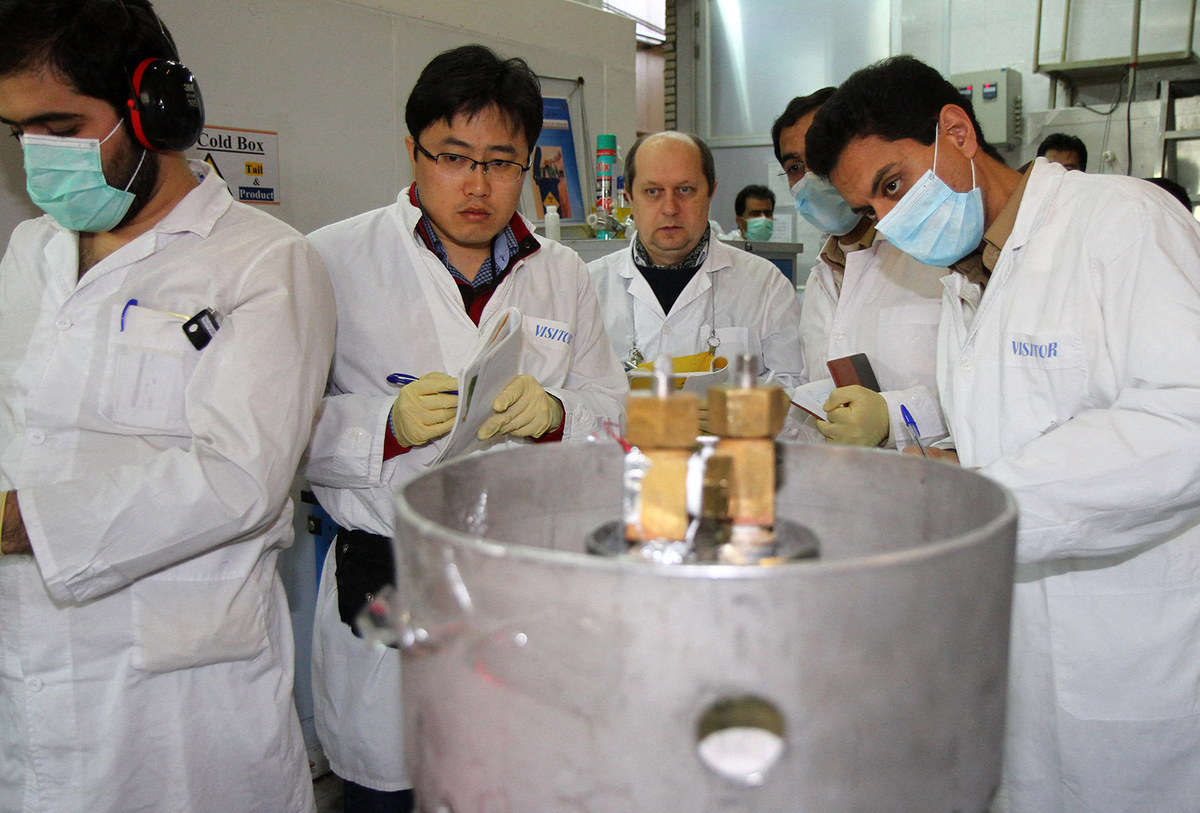
Iran’s hardline stance on IAEA inspections have been accompanied by continuous collaboration with regional militant groups, say experts. (AFP)
“As members of the Nuclear Non-Proliferation Treaty, states sign up to an IAEA comprehensive safeguards agreement and can add an additional protocol, but they don’t get to pick and choose which elements of those agreements they’ll comply with. By letting Iran do this, the IAEA set a very dangerous precedent for other proliferant states.”
One of the JCPOA’s more controversial conditions was to halt any further public revelations and inspections of Iran’s military research and tests related to nuclear weapons. Six years later, there is a sense that the revelations by a 2018 Israeli spy agency raid — which yielded tons of classified Iranian documents detailing various past covert nuclear weapons work — should prompt a comprehensive IAEA investigation into the military dimensions of Tehran’s nuclear program.
“There’s a fundamental incompatibility with how the JCPOA was used from 2015 to 2018 to shelve the IAEA’s investigation, and the fact that new information about Iran’s nuclear weapons activities has since come to light,” Stricker said.
“This underscores that the IAEA can’t perfunctorily close an open safeguards investigation. It must first methodically determine whether Iran’s nuclear program has military dimensions and seek to ensure any such activities have ended.
“From 2002 until 2015, the IAEA investigated the possible military dimensions to Iran’s nuclear program. However, the JCPOA and UN Security Council Resolution 2231 pushed the IAEA into another devastating compromise: Closing its investigation and issuing an incomplete, final report.”
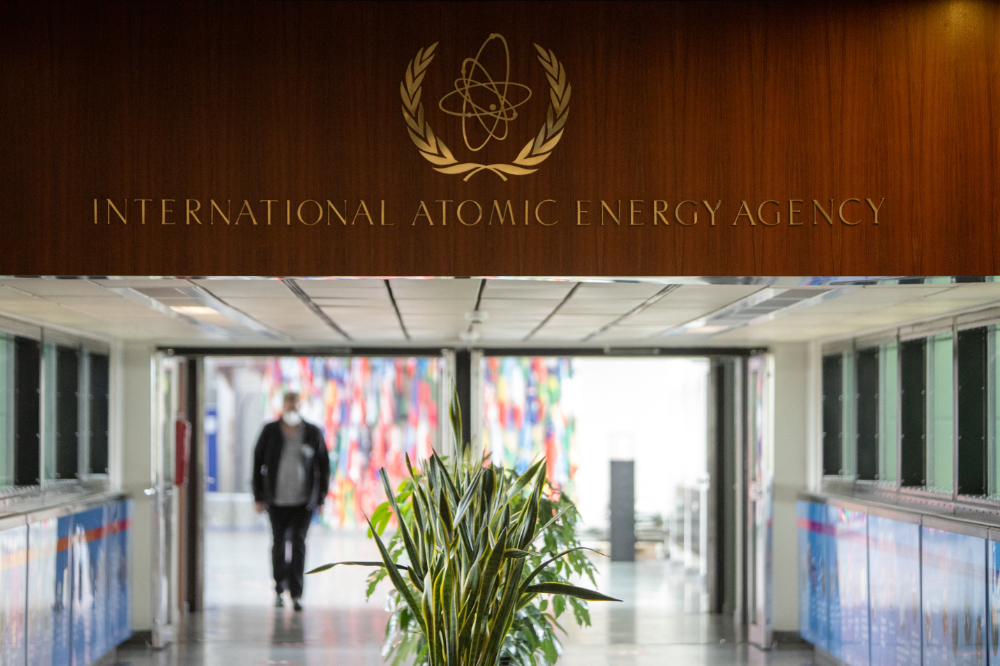
One of the JCPOA’s more controversial conditions was to halt any further public revelations and inspections of Iran’s military research and tests related to nuclear weapons. (AFP)
Jason Brodsky, a Middle East analyst and senior editor at Iran International, says Tehran has yet to be held accountable by the P4+1 — the UK, France, Russia and China plus Germany — for its uranium-enrichment escalation and stockpiling because of their determination to preserve the JCPOA, so it may have calculated that resistance will produce even more concessions.
“It’s worth noting that the international community merely issued strongly worded demarches while continuing to negotiate following Iran’s announcement that it was enriching uranium up to 60 percent in April,” he told Arab News.
“However, if Iran adopts such a stance on the IAEA monitoring agreement, it risks further isolating itself.”
While the general consensus of analysts is that Tehran’s hard line is aimed at extracting concessions from the US and the remaining JCPOA signatories while sacrificing little in return, an unfolding power struggle in the run-up to Iran’s presidential elections in June may also be a contributing factor.
“Granted, it’s the supreme leader, Ayatollah Ali Khamenei, who makes the final decision on such matters, but the Supreme National Security Council (SNSC) does have a role to play. And the SNSC’s internal dynamics have changed since the original nuclear deal was signed in 2015,” Brodsky said.
“President Hassan Rouhani faces competition from Ghalibaf and Chief Justice Ebrahim Raisi, both of whom joined the SNSC after the JCPOA came into being. What has further complicated matters is Raisi’s decision to run for president. This is in part why we see the mixed messages from Tehran over the IAEA monitoring agreement.”
Advocacy groups opposed to the 2015 nuclear accord have also warned that a new deal would be incomplete if it does not address Iran’s links with a number of designated terror groups and its hosting of Al-Qaeda leaders.
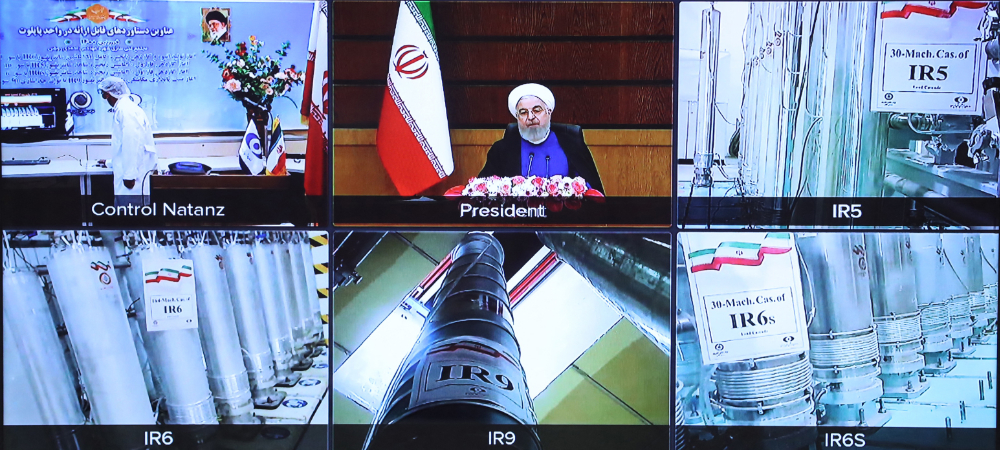
Some experts fear that a return to the JCPOA could end up offering Iran an eventual pathway toward developing nuclear weapons. (AFP)
Bryan E. Leib, executive director of Iranian Americans for Liberty, is blunt in his assessment of the Vienna negotiations. “The Biden administration is playing a dangerous game with the world’s most notorious state sponsor of terrorism that ultimately puts American allies and American troops in the region in harm’s way against the regime’s aggression,” he said.
Leib’s concerns are shared by many former Trump administration officials who enforced the “maximum pressure” campaign that revived and expanded sanctions on Iran’s nuclear research and development network, and on terror-linked individuals and organizations. Their worry is that Washington’s negotiation strategy would not only leave the US less secure but endanger the Middle East as well.
They argue that Iran’s hardline stance on IAEA inspections, its push for sanctions relief and its ramping up of its nuclear activity have been accompanied by continuous collaboration with regional militant groups.
“Because of its (the Biden administration’s) eagerness to throw away the hard-won leverage and make unprecedented concessions to the Iranian regime, I do think Iran feels it holds all the cards when it comes to the nuclear negotiations,” Simone Ledeen, a former Trump Pentagon official, told Arab News.
“In fact, in early May an unnamed senior administration official told reporters that ‘success or failure now depends on Iran.’ It’s the most stark and troubling indication that the US administration remains untroubled by the many signals that Iran will make no concessions.”
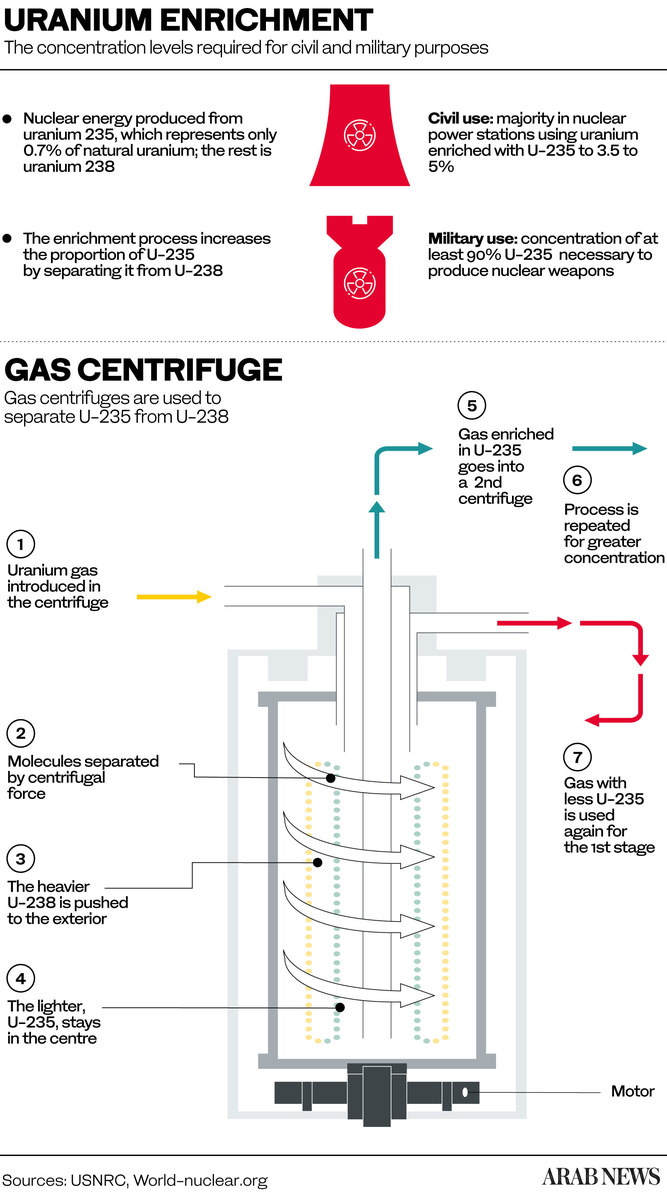
Ledeen’s opinion is seconded by Len Khodorkovsky, a former senior State Department official, who said: “The Biden administration’s astonishing generosity in surrendering its leverage in Vienna has undoubtedly motivated the Iranian regime to push the envelope. The big concern is that the Biden administration, like the Obama administration, is willing to sacrifice everything at the altar of a deal, even a bad deal that harms US national security and that of our regional allies.”
In the final analysis, Tehran is still no closer to achieving its goal of getting President Joe Biden to find a way back into the JCPOA than when he officially entered the White House in January. Indeed, at its current stated pace of uranium enrichment, Iran could very well end up with the wherewithal for exploding a nuclear device, but not the sanctions relief it desperately craves.
On the other hand, as IAEA chief Grossi diplomatically pointed out in the interview he gave to Financial Times, “with a program with the degree of ambition, sophistication that Iran has, you need a very robust, very strong verification system … otherwise it becomes very fragile.”
Preventing Iran from gaining the capability to build nuclear weapons will require, at a minimum, stringent measures backed by strict monitoring of all of Iran’s underground facilities, including the ones it has presumably not disclosed.
Twitter: @OS26



